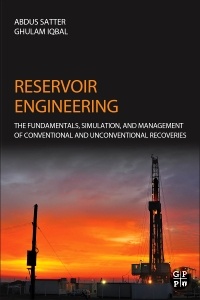Reservoir Engineering The Fundamentals, Simulation, and Management of Conventional and Unconventional Recoveries
Auteurs : Satter Abdus, Iqbal Ghulam M.

Reservoir Engineering focuses on the fundamental concepts related to the development of conventional and unconventional reservoirs and how these concepts are applied in the oil and gas industry to meet both economic and technical challenges. Written in easy to understand language, the book provides valuable information regarding present-day tools, techniques, and technologies and explains best practices on reservoir management and recovery approaches. Various reservoir workflow diagrams presented in the book provide a clear direction to meet the challenges of the profession. As most reservoir engineering decisions are based on reservoir simulation, a chapter is devoted to introduce the topic in lucid fashion. The addition of practical field case studies make Reservoir Engineering a valuable resource for reservoir engineers and other professionals in helping them implement a comprehensive plan to produce oil and gas based on reservoir modeling and economic analysis, execute a development plan, conduct reservoir surveillance on a continuous basis, evaluate reservoir performance, and apply corrective actions as necessary.
Ghulam Iqbal is currently an independent consultant based in Washington, DC. While previously working for Zakum Oil Company, Ghulam collaborated with a highly dedicated team which pioneered the application of multi-lateral horizontal well technology, and his career assignments involved the management of a giant oil field in the Middle East producing over half a million barrels of oil per day. Dr. Iqbal has conducted several hands-on workshops for oil and gas professionals overseas on reservoir engineering, asset management and petroleum basin modeling under the U.S. Agency for International Development program. He has been a member of SPE for over 25 years and is a registered professional engineer in the state of California. He holds a MS and PhD degree, both in Petroleum Engineering, from the University of Oklahoma.
- Connects key reservoir fundamentals to modern engineering applications
- Bridges the conventional methods to the unconventional, showing the differences between the two processes
- Offers field case studies and workflow diagrams to help the reservoir professional and student develop and sharpen management skills for both conventional and unconventional reservoirs
Date de parution : 09-2015
Ouvrage de 486 p.
15x22.8 cm
Thème de Reservoir Engineering :
Mots-clés :
abandonment; absolute porosity; adsorption; alkaline flood; Anadarko; analytic solution; and modular dynamic test; API gravity; appraisal and delineation; aquifer influx; Arkoma; Bakken; basin modeling; black oil model; bubble point; Buckley-Leverett; capillary pressure; carbon dioxide injection; catagenesis; chemical model; compressibility; condensing gas drive; conservation of mass; contingent resources; cricondenbar; cricondentherm; critical point; decline curve analysis; decline curve models; declining reservoir performance; depletion drive; depositional environment; development; dew point; diffusivity coefficient; diffusivity equation; dimensionless pressure; discovery; drawdown test; drillstem test; dual porosity; Eagle Ford; economic analysis; engineers; enhanced oil recovery; enhanced recovery; EOR; equation of continuity; exploration; exponential decline; extra heavy oil; Fayetteville; flow regimes; flow units; formation volume factor; gas cap drive; gas condensate; GIIP; grain volume; gravity segregation; Haynesville; HCPV; heavy oil; history match; horizontal drilling; horizontal well; hydraulic fracturing; hydrocarbon in place; infill drilling; injection pattern; interfacial tension; interference well test; internal rate of return; Langmuir isotherm; liquid and rock expansion; long radius; managements; Marcellus; material balance; matured fields; Means San Andres; medium radius; minifrac test; miscible flood; Monte Carlo simulation; multilateral; multistage fracturing; nanodarcy; natural gas properties; numerical simulation model; oil and gas ventures; oil in place; oil properties; oil sands; oil shale; oil viscosity; oil window; OOIP; payout period; permeability



